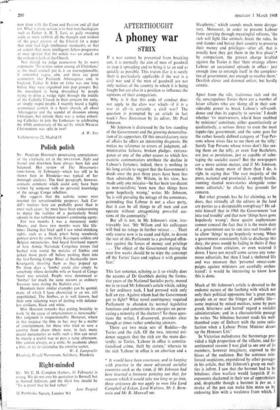Polish polish
Sir: Penelope Houston's penetrating appreciations of the cinematic art in the SPECTATOR, Sight and Sound and elsewhere have always been fair and balanced. Her review of The Mercenaries (SPECTATOR, 16 February)—which has still to be shown here in Rhodesia—was typical of her thorough analyses. The final paragraph, however, contains comment which could only have been written by someone with no personal knowledge of the savage Congo rebellion.
She suggests that the sadistic scenes were inserted for sensationalistic purposes. Jack Car- diff's motives here are probably purer than in most such cases: he must have been endeavouring to depict the realities of a particularly brutal episode in that turbulent nation's continuing agony.
For two months I was a mercenary under Hoare, and those two months were like life- times. During that brief spell I saw mind-shrinking sights, such as a black priest being senselessly gunned down by some thirty Katangese soldats and Belgian mercenaries. And heard first-hand reports of how Armee Nationale Congolese troops tied barbed wire round the testicles of Simbas and jerked those parts off before pushing them into the fast-flowing Congo River at Stanleyville (now Kisangani), shooting them as they popped up. ffn those days a `Simba' could also simply be somebody whose desirable wife or hoard of Congo boart was coveted. People were denounced as 'Simbas' for much the same reasons as ordinary Russians were during the Stalinist era.) Hundreds more similar examples can be quoted, many of which I have chronicled in an ms, still unpublished. The Simbas, as is well known, had their own sickening ways of dealing with defence- less civilians, black and white.
Miss Houston remarks that putting brutality to ','ork 'in the cause of entertainment is inexcusable' Her judgment is unquestionable. However, where in this instance the film, to her. may be a matter of entertainment, for those who tried to save a country from chaos (there were, in fact, many decent mercenaries as well), such a film can never be merely a useful way to pass a rainy afternoon. One cannot always, as a critic, be academic about a film, or try to rationalise the emotive scenes.


































 Previous page
Previous page